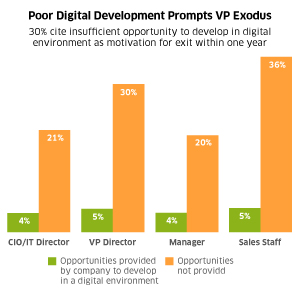Building the Workforce of the Future – Culture is King
In 2014, Cisco Supply Chain Operations leadership unanimously and enthusiastically took up the challenge of developing and delivering a workforce strategy to meet the talent demands of the supply chain of the future.

Source: MIT Sloan Management Review/Deloitte University Press
There is no question that supply chain organizations play a key role in modernizing a business, but you cannot achieve the supply chain of the future without investing as much, or more, in recruiting, upskilling, and retaining your talent as you do in transforming the factory floor. Human capital is arguably the single most important investment you make as a leader. What’s more, to excel in any industry today, leadership must create a culture that attracts, inspires and continuously nurtures top talent. In fact, when it comes to your workforce, culture is king.
That’s why Cisco supply chain senior leadership is actively, daily and ubiquitously driving a workforce strategy based on continuous learning and career development. More than 150 directors, senior directors, vice presidents and senior vice presidents are committed to a workforce strategy built on four foundational cornerstones, all firmly rooted in the growth and retention of our people.
1. Plan and Design: We spent several months carefully assessing every aspect of our workforce in order to architect a global site plan that ensures alignment of people to strategy. In addition to locations, we carefully examined what type of skills and abilities we would need for the future. We considered future trends that might impact our plan, all the while aligning to Cisco’s business drivers. And we made this information available to employees to help guide their career planning.
2. Attract and Retain: We always knew we needed the right people, in the right places, at the right time, but talent and demographic shifts required us to rethink which universities and talent pools we recruit from. As required skills have changed, we needed to be sure that we built strong relationships with educational institutions willing to evolve their curriculum to reflect changes in the employment landscape. And, while actively recruiting the best and brightest, we never lose sight of making sure our highly valued existing talent remains with us. Every manager sits down and creates a development plan with his or her employees.
3. Employee Engagement: Did I mention that culture is king? Leadership knows that the success of our workforce strategy depends on them building a culture that encourages employees to flourish. Whether it is new hires in their first professional job or seasoned professionals, our culture of continuous learning supports employees in proactively driving their careers, as well as developing new skill sets and competencies—both business and technical. The goal is to create a deep pool of well-rounded, holistically developed talent that is agile enough to meet today’s demands while capable of quickly evolving to meet tomorrow’s.
4. Monitor. Measure. Modify: As our workforce strategy matures, leadership will continuously monitor, measure and modify our plan. Leadership is fully committed to a “living” workforce strategy.
“You cannot achieve the supply chain of the future without investing as much, or more, in recruiting, upskilling and retaining your talent as you do in transforming the factory floor.”
Here are a few of the programs and tools specifically created by supply chain for supply chain to realize this Cisco leadership-driven workforce strategy.
- The Career Power Program has been an unqualified success for the past two years. It includes newsletters, webinars, job listings for rotations, swaps, stretch assignments and job shadowing, as well as a continuous pipeline of learning opportunities, both business and technical. In addition, Career Power Advisor Weeks give employees the chance to meet with senior leaders of their choice to discuss their careers.
- Career Navigator is a powerful web-based tool that assists employees with career planning by putting at their fingertips detailed descriptions for every job family in supply chain. Accompanying each job family are the specific responsibilities and competencies for the roles. When employees are ready to plan their next career move, Career Navigator shows them where they might need to upskill their qualifications. Senior leaders with expertise in each job are available to answer questions and give advice.
- Knowledge University: Under the Career Power Program, supply chain’s Knowledge University offers a wide variety of classes, both online and at global sites. Enthusiastically supported by their managers, employees can grow their business and technical competencies in areas as diverse as effective communications, project management, strategic thinking and business analytics.
- University Engagement and Global Recruitment: We have globalized our recruitment strategy. We are partnering with accredited supply chain university programs to adjust curriculum to include additional important skills, such as PYTHON programming and data analytics.
- Our New Hire Program develops and maintains a global and consistent onboarding and early employee experience that supports the success of new hires. Managers proactively encourage new hires to rapidly integrate into the larger supply chain organization by attending events such as lunch-and-learns with leadership, as well as training classes.
“We are partnering with accredited supply chain University programs to adjust curriculum to include additional important skills, such as PYTHON programming and data analytics.”
Building the supply chain workforce of the future doesn’t happen overnight. But with the wholehearted, long-term commitment of its leadership team, Cisco supply chain is well on its way; a direct result of its culture of continuous learning and professional development.
Related Resources
- Research Report: Supply Chain Talent of the Future, Deloitte Consulting LLPEU
- Initiative: e-Skills for Jobs and Growth
- Blog: Watson Supply Chain Addressing the Talent Crunch Head-On, IDC
- Continuing Education: MIT MicroMasters Degree in SCM
